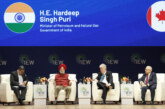Setbacks To World Peace
By Dr Arvind Kumar
According to the latest edition of the Global Peace Index, an annual ranking of 153 countries, the world became slightly less peaceful in 2010, punctuated by violent uprisings in North Africa and the Middle East, but also marked by successes in countries like Slovenia and Georgia. It is further revealed that the average world peace score dropped by just over 1 percent — a number that may seem small, but which represents the continuation of a steady slide, as well as some dramatic recent events. Published by Australia’s Institute for Economics and Peace, the index is the first in the crowded world of think-tank-produced rankings to try and quantify the philosophically challenging idea of peace. The data, obtained from the United Nations, rights groups, and other sources, reflects more than 20 internal and external indicators of peace, including the number of deaths from conflict, the threat of terrorism, the likelihood of violent demonstrations, and the national military budget.
While more stable, peaceful societies could emerge in the region as a result of the Arab uprisings, says Abruzzese, the immediate result was a dramatic rankings drop for countries like Libya and Bahrain. Libya’s fall of 83 places was the largest in the history of the index. In the case of Iraq, however, there is also a bright side, even though its ranking indicates that there is much room for improvement. Afghanistan, ranked fourth from the bottom, experienced yet another year of intense armed conflict, and Russia, just three spots ahead, experienced a drop in its score due to increased potential for terrorist attacks and continuing violence in the North Caucasus. The most peaceful country in this year’s ranking is Iceland, pushing New Zealand into second place. And while the top 10 features some expected countries, including Japan and Denmark, the group has become more geographically diverse than in previous years. Slovenia comes in at number 10, while the Czech Republic is ranked fifth-most peaceful in the world. The United States ranks 82 out the 153 countries included.




